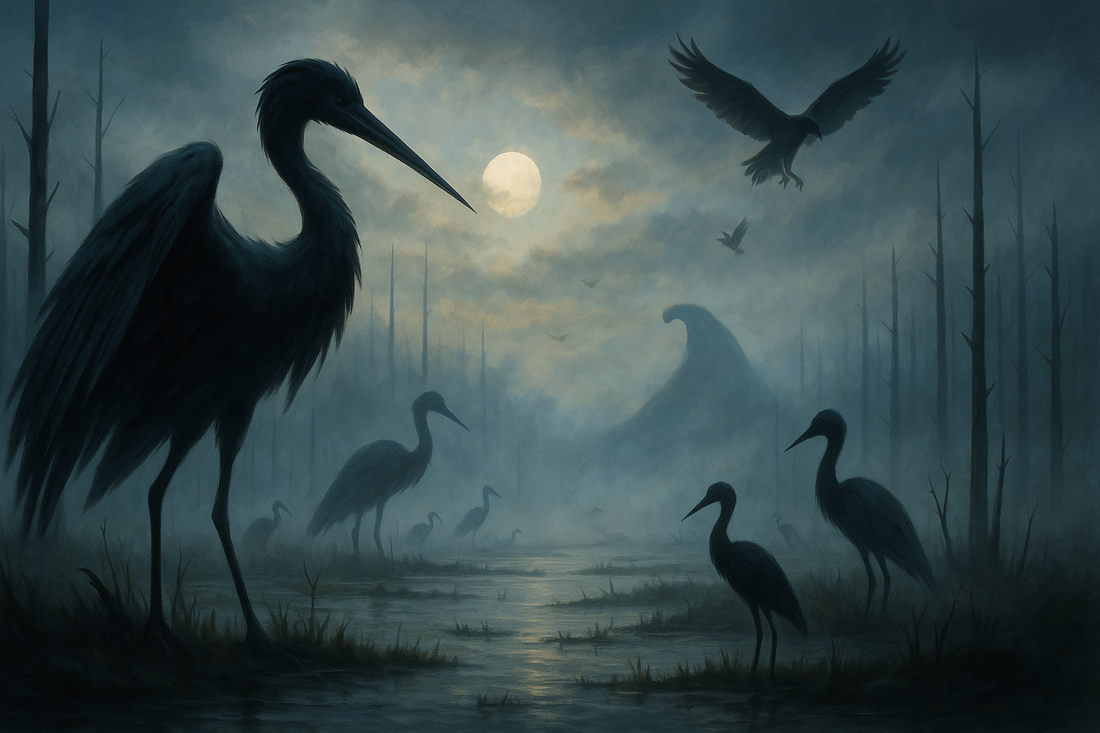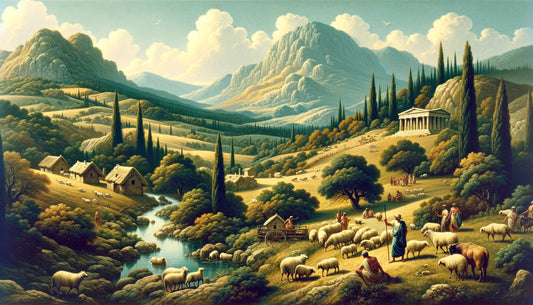
The Stymphalian Birds - Hercules Sixth Labour
Continuation of the story The Augean Stables.
King Eurystheus received Hercules, freshly returned from the kingdom of Elis. Word had reached him of the hero’s triumphant departure, widely praised by the people. He showed little interest in hearing more about that deed. As such, he remained unaware of the dispute between Hercules and King Augeas, which had ultimately led to the hero’s expulsion from the realm.
Eurystheus tried to mask his irritation. Once again, jealousy crept over him—jealousy of the hero’s courage and valour. He made great efforts to conceal his true feelings, constantly attempting to display signs of grandeur and benevolence which, as king, he sorely lacked.
After a few moments of silence, feigning deep thought as if deliberating over the next task, he suddenly declared:
“The news from Arcadia is most troubling. Lake Stymphalus is utterly infested with dreadful birds! I’m not certain how they came to be there, but if they are not stopped, the entire kingdom is in danger. Go and rid us of this plague!”
Without uttering a word, but with a respectful bow to the king, Hercules left the palace and set off towards Lake Stymphalus.
Birds of War
In ancient times, all wars were fought by land or sea. The only weapons that could fall from the sky were arrows shot from a good position on the ground, often from towers or high walls to achieve greater range. No one—nor any war technology—could fly above a region. The power of the skies belonged to the gods.
And only a god could have created such airborne creatures of war. The birds that occupied Lake Stymphalus were beasts consecrated to Ares, god of war. They were giant birds, as tall as cranes, with iron beaks and bronze talons. Their droppings were toxic and corrosive, causing decay and death wherever they fell.
The wooded shores of Lake Stymphalus had become completely infested with these creatures. They had taken over the area, not only wreaking havoc on all flora and fauna but also driving farmers away from their land. If you dared step out from the trees, you risked being devoured.
The lake stood still. Only the screeches of those creatures broke the silence of a place now nearly bewitched.
A Gift from Athena
When Hercules arrived at Stymphalus, he did so with caution. He knew little about those birds and, as he had done before, he wanted to observe them before confronting them. To get closer, he camouflaged himself among the trees surrounding the lake. As he approached, he felt the ground becoming softer. That land was no longer as it once had been. The forest encircling the lake had turned into a foul-smelling marsh.
Looking up, Hercules could see countless nests among the tree branches. The further he advanced, the more nests he encountered. The droppings that fell from them—highly poisonous—softened the ground, made it acidic and turned it infertile. Near the lake’s edge, many trees had already withered and died, some fallen into large pools of mud, victims of that filth.
Hercules wasn’t sure where the birds were hiding. Were they in the nests or among the mist covering the lake? In order to identify them, he kept moving forward without making a sound. He took one step ahead and suddenly the ground gave way beneath him, trapping him up to his shoulders. Before sinking completely, he grabbed a tree root to pull himself back and escape the trap. Continuing through this terrain was too dangerous—he needed to think of another way forward.
The goddess Athena, who had been watching Hercules’s movements from the clouds, refused to leave the hero stranded. To help him out of that impasse, she appeared before him and handed him an artefact that would aid him. It was a large metal rattle, forged by Hephaestus himself in his forge. Everything clicked in his mind: the moment for action had arrived!
The Victorious Double Strike
Hercules made a sudden sweep with his arm, shaking the rattle with great force. The clanging of the divine metal rang out between the trees, making the branches and the few remaining leaves tremble. The sound stretched through the air, creating a powerful reverberation that reached all the way to the sky.
Those vibrations were soon met with the groans and shrieks of the birds. The deafening noise from the rattle frightened and maddened them, causing them to take off in a frenzied stampede. Whether they had been in their nests or hidden within the mist above the lake, all rose together to darken the sky with their shadowy forms.
Amidst that aerial chaos, Hercules swiftly took his bow and began firing arrows upwards with tremendous force. With the sky so densely packed, it was easy to bring down more than one bird with each shot.
Realising they were under attack, the birds dived in an attempt to maim the hero. But once again, Hercules rattled the instrument with tremendous intensity. The sound echoed across the area once more. Unable to bear the vibrations, the beasts rose into the air again to escape both the noise and their opponent. This gave Hercules the chance to defend himself and resume his volley of arrows — a dual assault that gave the creatures no respite.
More and more of the cursed birds fell. With each attempt to descend and retaliate, the rattle sounded again and sent them fleeing. Eventually, the remaining birds, unable to endure it any longer, took flight and fled the Stymphalian Lake for good.
Hercules lost track of them — at least for the time being. Still, as he had been commanded, he had freed the lake from that deadly infestation. His sixth labour was complete.
Continues with The Cretan Bull.
Honouring the Legend
Hercules’ clever strategy and his battle against the Stymphalian birds leave us with a legend of courage, ingenuity, and determination. To commemorate this feat, we present this unique T-shirt paying homage to the moment when the sky was freed from a plague that once seemed unstoppable.

As we cannot provide you with a sacred piece, we do not want to sacrifice any animal for a piece of clothing. All our items are 100% cotton and made with the utmost respect for the environment. LũM always aims to respect the flora and fauna of our planet.
Thank you for your trust, and may the adventure continue!
Reading list
- Labours of Hercules. Wikipedia, the Free Encyclopedia.
- Fry, S. (2018). Heroes. Penguin Books.
- Hamiltor, E. (1942). Mythology, Timeless tales of Gods and Heroes. Little, Brown and Company.
- Graves, R. (1955). The Greek Myths. Penguin Books.


